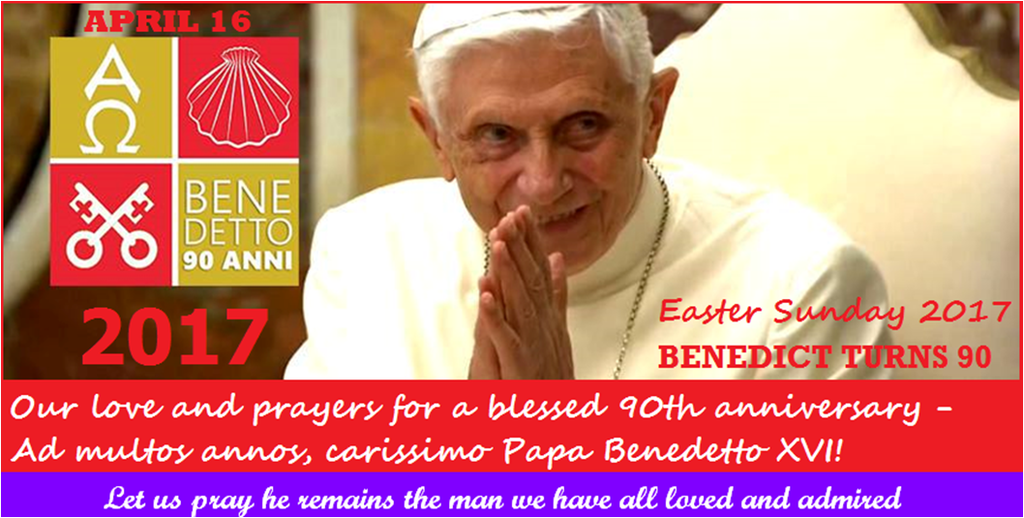 I must confess I have been unable to translate so far three interviews about Benedict XVI which were given to honor him on his 90th birthday... Meanwhile, Fr. De Souza has focused on a singularity that distinguishes Benedict XVI from all other popes...
The biblical crisis
I must confess I have been unable to translate so far three interviews about Benedict XVI which were given to honor him on his 90th birthday... Meanwhile, Fr. De Souza has focused on a singularity that distinguishes Benedict XVI from all other popes...
The biblical crisis
that Benedict XVI resolved
Since the 19th century, Scripture scholars had started to read the Gospels
Bible as if it were simply a literary text. Benedict XVI helped to change that
by Fr Raymond de Souza

April 20, 2017
Before the ninetieth birthday of Pope Emeritus Benedict XVI on Easter Sunday, Tracey Rowland published in these pages an appreciation for what she called a “Ratzinger revolution” – a theological foundation on which, she predicts, future scholars and pastors will rebuild a Church damaged by secularism. Rowland speaks of a “treasury to be mined by future generations trying to piece together elements of a fragmented Christian culture.”
Yet as “Father Benedict” turns 90, it is evident that a great deal has already been built upon his thought. Future generations will certainly develop that further, but rather than building a house upon Ratzinger/Benedict’s foundation, they will be finishing rooms that he has already roughed in.
Or to push the metaphor in the opposite direction, the foundations of the household of faith were being radically undermined, and Ratzinger did much of the necessary restorative work to shore them up.
While the breadth of Ratzinger’s thought touches on the full range of theology, and other disciplines besides, his key contributions – where the foundation was most threatened – were the place of sacred scripture, the correct interpretation of Vatican II, and the liturgy.
By the time Ratzinger was ordained in 1951, several generations of biblical scholarship – while making great scientific advances – had begun to erode the central and sacred role of the Bible in the life of the Church.
Advances in biblical archaeology, study of ancient languages and literary criticism had produced remarkable new understandings of the biblical texts. Scripture scholarship, though, had slipped away from theology and become something akin to classics, as if the Bible were Greek epic poetry or Latin rhetoric.
Ratzinger accepted all that was good in the new methods, but insisted that
if the Scriptures were to have any relevance for today, they had to be read in light of the faith, to be read as divine revelation received and lived by the Church. Biblical scholarship that, for example, tried to get to the “real” text behind centuries of patristic reflection, was treating the text as something separate from the people it was addressed to – the Church.
His theological work bore fruit in two key documents, the Pontifical Biblical Commission’s "The Interpretation of the Bible in the Church"(1993) and the fruit
of the first synod he summoned as pope,
Verbum Domini (2010).
Yet it was his decision to publish, while pope, a three-volume study of the life of Christ (JESUS OF NAZARETH) that will have the greatest impact. Instead of proposing how biblical study ought to be done, Ratzinger-Benedict got on with it and did the job himself, confirming in the masterful trilogy that he was probably the most learned man alive.
His biblical project was critical to his work in securing the authentic teaching of Vatican II.
Everyone remembers Benedict for proposing the “hermeneutic of continuity and reform” against a “hermeneutic of rupture”. But he went to the root cause of the rupture. Vatican II called for a biblical renewal of theology, especially moral theology and the liturgy.
Yet how could the scriptures be the “soul of theology” if they had ceased to live themselves? A dead soul could only produce dead fruit, and ruptures multiplied as many currents of secular thought replaced the biblical word. Vatican II’s implementation presumed a biblically rich theology that was not sufficiently developed at the time of the Council. To the extent that this has been remedied since, Ratzinger has been a key influence.
In the liturgy, in which Ratzinger was an even more singular force, he applied the same principle as his biblical theology. The liturgy was not an object to be manipulated, much less a relic to be analyzed, but could only be understood in the life of the Church of which it served as both “source and summit”.
His profoundly biblical understanding of the liturgy brought it once again in contact with its inspired nature, a privileged work of the Holy Spirit. Ratzinger/Benedict is no rubricist, let alone a devotee of archaic forms simply for the sake of antiquity. Yet if the liturgy truly belongs to the life of the Church, it must guard its deposit while developing its expression. That’s why Benedict’s call for a mutual enrichment between the two forms of the Mass is just that – a mutual, not unilateral, process.
At ninety, Benedict has lived long enough to see crises erupt, crises engaged, and now the beginning of crises resolved.
One might say that even more important than the 'hermeneutic of continuity' that Benedict XVI advocates as the only truthful and faithful interpretation of Vatican II - the same hermeneutic BTW (with respect to the Church's Revelation-based teachings upheld through 2000 years of Tradition and Magisterium) that orthodox Catholics charitably apply to the openly heterodox if not near-heretical propositions that constellate Chapter 8 of Amoris laetitia - Benedict XVI has given us in the JESUS trilogy the only possible hermeneutic of Jesus, true God and true man.
[Modificato da TERESA BENEDETTA 22/04/2017 06:01]